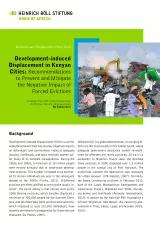Development Induced Displacement in Kenyan Cities
In Kenya, the design and implementation of urban development plans in cities reveal systematic patterns of dispossession and disruption to the lives of low-income city dwellers. Populations living in informal settlements are routinely displaced by the development of property and infrastructure in cities like Nairobi and Mombasa. Oftentimes they are expelled from their homes in large numbers under violent and coercive circumstances to make way for the construction of roads, real estate and commercial plazas. Rarely do they receive compensation for their losses. Nor any kind of support for the costly relocations they are forced to undertake after being displaced.
It is estimated that by 2030, more than half of Kenya’s population will be urbanised, with a risk that three-quarters of the population will reside in informal settlements. In light of these trends and developing scenario, the author makes a number of recommendations to prevent and mitigate the harmful consequences of development-induced displacement on individuals and communities in Kenyan cities.
Above all, he calls for the implementation of existing legal frameworks, in particular rights-based provisions within the Constitution of Kenya 2010 and international law. He also advocates participatory urban planning in which stakeholders are consulted at an early stage of planning, and a whole-of-government approach that engages local communities to ensure development-related goals are pursued with due consideration for human rights.
Where prevention and/or mitigation are not an option, pragmatic courses of adaptation are delineated. These should piggy-back upon more general approaches to resilience-building that form part of the globalized response to climate change.
Finally, Development-induced Displacement in Kenyan Cities calls for attentiveness to the ways in which forced evictions are linked with other kinds of internal and cross-border displacement, such as refugee movements. At the international level, a greater role for migration and displacement agencies such as the IOM and UNHCR is envisaged.
Author
Fabian Oriri is a human rights lawyer and consultant specializing in law and policy as it affects refugees and migrants in Kenya. He has worked at Kituo Cha Sheria, among other organizations. His interests lie in employing practical and people-centric approaches to drive meaningful social transformation through the development and implementation of legal frameworks.
